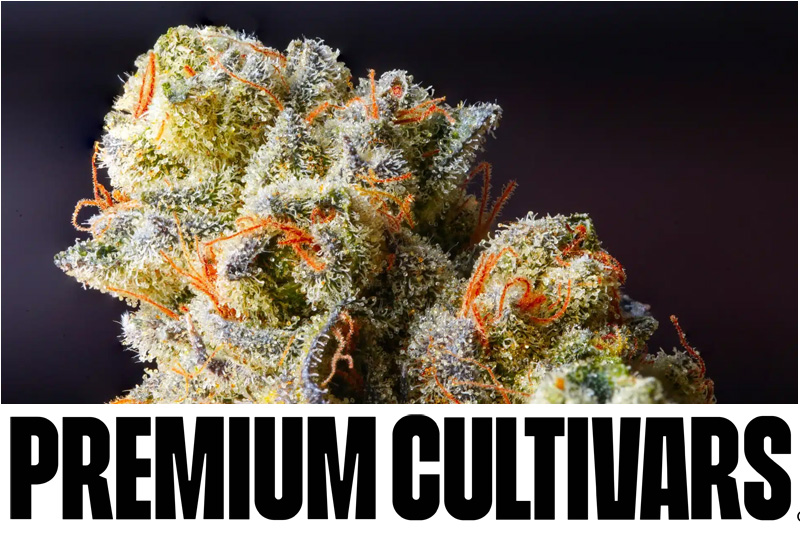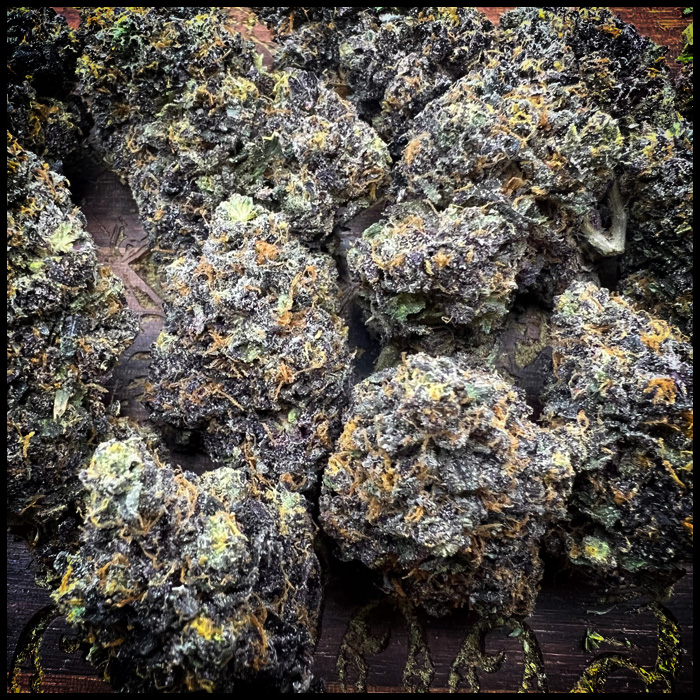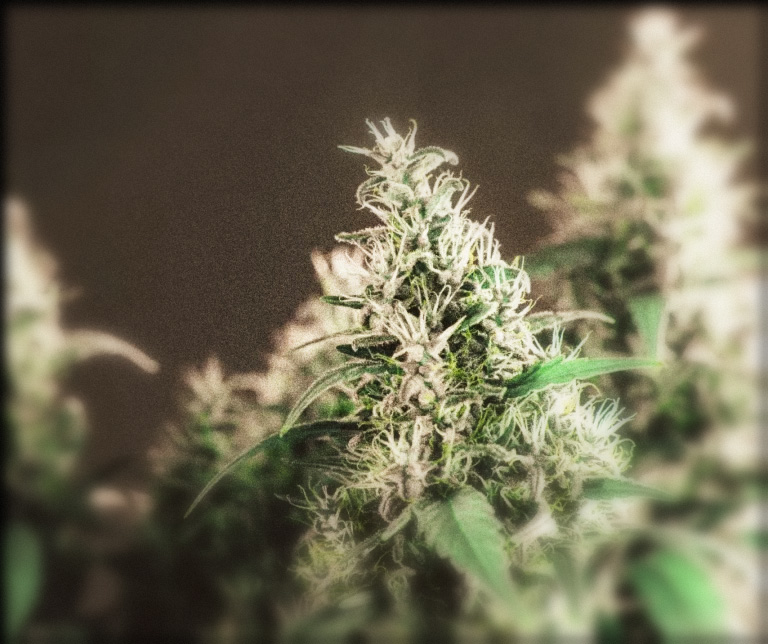Table of Contents
- 1 Understanding THCA: What is it Exactly?
- 2 The Science Behind THCA’s Pain Relieving Properties
- 3 How THCA Differs from Opioid Pain Medications
- 4 THCA is Safer, Non-Addictive, and just as Effective (IMO)
- 5 THCA vs THC – How is it Different?
- 6 Is the Use of THCA Flowers Addicting?
- 7 The Top 5 THCA Flower Strains
- 8 The Top 4 Ways to Consume THCA Flowers
- 9 The Legality of THCA Products
- 10 Potential Side Effects of THCA and Precautions to Take
- 11 Conclusion: Should THCA Flowers Replace Opioids for Pain Relief?

Before you read my in-depth piece on THCA Flowers, ask yourself; “Are you tired of relying on opioid pain medications that come with a laundry list of side effects?” Then read on…
Looking for a natural and effective alternative to manage chronic pain should be on every pain patient. That’s why I have been using THCA flowers since 2019.
These extraordinary blooms offer astounding and genuine pain relief, without the addictive properties of opioids. I’m going to dive into the science behind THCA’s pain relieving properties and explore its differences from THC.
I will highlight some popular strains, discuss various consumption methods, and examine the legality and potential side effects.
By the end of this you’ll know how THCA can be your new best friend in the battle against chronic pain.
Understanding THCA: What is it Exactly?
THCA, or tetrahydrocannabinolic acid, is a non-psychoactive compound found in raw cannabis plants.
Unlike THC, which is the well-known psychoactive component of cannabis, THCA does not produce a high when consumed.
Instead, it offers a host of therapeutic benefits that make it particularly effective for pain relief and anti-inflammatory purposes.
In its natural form, THCA exists as an acidic precursor to THC. Through a process called decarboxylation, this compound can be converted into THC when exposed to heat or light.
However, it’s important to note that consuming raw or lightly heated cannabis flowers allows for the retention of THCA without the intoxicating effects associated with THC.
Solid Research suggests that THCA possesses potent anti-inflammatory properties and helps alleviate chronic pain by interacting with our body’s endocannabinoid system (ECS).
The ECS (endocannabinoid system) plays a crucial role in regulating various physiological functions such as pain perception and inflammation response.
By modulating the ECS receptors known as CB1 and CB2 receptors within our bodies, THCA has shown promise in reducing inflammation levels and easing discomfort associated with conditions like arthritis, fibromyalgia, and migraines.
When considering using THCA for pain relief or other therapeutic purposes, it’s important to consult with your healthcare provider beforehand.
These days the vast majority of doctors will enthusiastically encourage you to try natural remedies over opioids, unless you have an underlying medical problem that would prevent it.
Doctors can provide guidance on dosing, safety, and potential drug interactions. I know for my own well-chronicled chronic pain journey, THCA Flower consumption increased the quality of my life like nothing before it.
Though generally considered safe, the use of any substance should always be approached responsibly. (I have to say this)
Using responsively will ensure you receive maximum benefit while minimizing any potential risks.
The Science Behind THCA’s Pain Relieving Properties

I may repeat a bit of what I wrote above, but I do so because it bears repeating, perhaps even more than once.
THCA, or tetrahydrocannabinolic acid, is a compound found in cannabis plants. While it may sound like THC, the psychoactive component of marijuana, THCA possesses its own unique properties. One of the most exciting aspects of THCA is its potential for real, genuine, and long-lasting pain relief.
The science behind THCA’s pain relieving properties lies in its interaction with the endocannabinoid system (ECS) in our bodies. The ECS plays a crucial role in regulating various bodily functions, including pain perception and inflammation. When consumed, THCA interacts with CB1 and CB2 receptors within the ECS, helping to modulate these processes.
Studies have shown that THCA has potent anti-inflammatory effects. Inflammation can cause discomfort and contribute to chronic pain conditions such as arthritis (my decades old issue) or fibromyalgia. By reducing inflammation levels in the body, THCA can provide much-needed relief for individuals suffering from chronic pain.
Additionally, research suggests that THCA may also influence serotonin receptors in our brains. Serotonin is a neurotransmitter known for its role in mood regulation and pain perception. By targeting these receptors, THCA may help alleviate both physical and emotional aspects of pain.
To downplay “emotional aspects of pain” is ignoring a major component of a true chronic pain patient. Alleviating, or even lessening the emotional component of pain can go a long way to increasing the quality of life aspect.
It’s important to note that while there is promising scientific evidence supporting the use of THCA for pain relief, further research is still needed to fully understand its mechanisms of action and efficacy. Not because it may not work, but rather because further research can help with developing better strains, more focused consumption methods, and maximizing its benefits.
Look, the science behind how THCA provides pain relief revolves around its interactions with the endocannabinoid system and serotonin receptors in our bodies.
These interactions help reduce inflammation levels and modulate our perception of both physical and emotional discomforts associated with chronic pain conditions.
Conducting more studies can provide definitive conclusions about using THCAs as worthy alternative treatment options for managing chronic pain.
How THCA Differs from Opioid Pain Medications
When it comes to pain relief, there are various options available, including opioids as well as THCA. However, it’s important to understand the differences between these two approaches. Trust me, I know all about first-hand use of opioids.
I used several different opioid medications over the past 35 years. I would still be using them if my 7-year long stint at a local pain clinic wasn’t cut short because my overworked and underpaid pain doctor quit pain management altogether and moved to General Practice. She left 300 patients with 1x 28-day prescription, then removed herself from every patient’s reach.
So, let’s talk about opioids for a quick minute. Opioid pain medications work by binding to opioid receptors in the brain and blocking pain signals. They are highly effective but also come with a range of potential side effects such as drowsiness, constipation, and addiction.
Other side effects are accidental overdose resulting in death, (though honestly, there is no real crisis with opioids. This so-called crisis is a generated narrative, a false flag operation, a manipulation.)
THCA is Safer, Non-Addictive, and just as Effective (IMO)
On the other hand, THCA offers a natural alternative for pain relief. Unlike opioids that directly target the brain’s receptors, THCA works through its anti-inflammatory properties. This cannabinoid is found in raw cannabis plants and is non-intoxicating.
endocannabinoid system – again – jm
THCA interacts with our body’s endocannabinoid system (ECS), which plays a role in regulating pain sensation among other functions. By interacting with ECS receptors like CB1 and CB2, THCA can reduce inflammation in the body and alleviate chronic pain without causing dependency or intoxication.
Additionally, unlike opioids that can have harmful long-term effects on organs such as the liver or kidneys when used chronically, THCA poses minimal risks to overall health.
In summary, THCA differs from opioid medications as it offers a natural alternative for managing pain without the risk of addiction or severe side effects associated with opioids.
THCA vs THC – How is it Different?
When it comes to cannabinoids, two terms that often get mentioned are THCA and THC. While they may sound similar, they have distinct differences in terms of their chemical composition and effects.
THC, or delta-9-tetrahydrocannabinol, is the psychoactive compound responsible for the “high” associated with marijuana use. It binds to receptors in the brain and nervous system, producing euphoria and altering perception. This is why THC has gained popularity among recreational users.
On the other hand, THCA stands for tetrahydrocannabinolic acid. It is a non-intoxicating compound found in raw cannabis plants before decarboxylation occurs – a process that converts THCA into THC through exposure to heat or light. Unlike THC, consuming raw cannabis containing THCA won’t produce any (or a lot) psychoactive effects.
Despite not having intoxicating properties like THC, THCA offers its own set of potential benefits. Research suggests that it possess anti-inflammatory properties which is helpful for managing pain and reducing inflammation without experiencing unwanted side effects such as impairment or cognitive changes commonly associated with THC consumption.
It’s worth noting that when you ingest dried or heated cannabis flowers containing high levels of THCA (as opposed to consuming them raw), some conversion from THCA to THC can occur due to decarboxylation during smoking or vaping sessions. (Which is sometimes nice)
However, if you’re specifically looking for a non-intoxicating experience while still harnessing potential therapeutic benefits like reduced pain and inflammation management offered by cannabinoids present in raw cannabis then focusing on strains with higher concentrations of naturally occurring THCA would be more suitable than relying solely on the conversion process via heat activation.
Once again, TCHA differs from THC primarily in its chemical structure and lack of psychoactive effects. While both compounds offer potential health benefits including pain relief and anti-inflammatory properties, TCHA provides an alternative option for those seeking therapeutic effects without the risk of intoxication.
Is the Use of THCA Flowers Addicting?

One common concern among individuals considering the use of THCA flowers for pain relief is whether it can lead to addiction.
It’s important to understand that addiction typically occurs with (any) substances that have psychoactive properties, such as THC or Funny Bones. However, unlike THC, THCA does not produce a high or intoxicating effect. Although you can eat enough Funny Bones that the sugar high can really mess you up.
THCA flowers are derived from cannabis plants and contain minimal levels of THC. While some may argue that any form of cannabis has potential addictive properties, research suggests that the risk of addiction associated with THCA flowers is extremely low.
Unlike opioids, which are notorious for their addictive nature and dangerous side effects, using THCA flowers as a natural alternative for pain relief poses significantly less risk.
The non-addictive nature of THCA makes it an appealing option for individuals seeking long-term solutions to chronic pain management without the fear of developing dependency. And that my friends, makes all the difference in the world.
It’s essential to note that individual responses to any substance can vary, so if you have a history of substance abuse or addiction tendencies, it’s wise to consult with a healthcare professional before incorporating THCA flowers into your routine. As I said, some people have such strong addictive personalities practically anything can be addictive to them.
The Top 5 THCA Flower Strains
The world of cannabis is vast and diverse, offering a plethora of options for those seeking relief from pain. When it comes to THCA flower strains, there are several standout varieties that have gained popularity among users looking for potent pain relief and anti-inflammatory properties.
I recently had the opportunity to try some incredible THCA strains from Premium Cultivars, and I must say, they left quite an impression on me. Each strain offered a unique and delightful experience that showcased the skill and expertise of the cultivators.
1 – Jealousy, the first strain I tried, was a true standout. Its vibrant green buds were covered in glistening trichomes, giving it a frosty appearance. The aroma was a mix of earthy and citrus notes, and the taste was smooth and flavorful. But what truly impressed me was its potency. Jealousy had a high THCA content, and it delivered a euphoric and uplifting high that left me feeling creative and inspired.
2 – Gushers was another strain that caught my attention. Its dense, resinous buds had a sweet and fruity scent that was simply irresistible. When I smoked it, I was greeted with a relaxing body high that melted away any tension and stress. Gushers was the perfect strain for winding down after a long day.
3 – Permanent Marker had a unique and intriguing flavor profile. The buds had a deep purple hue, and the aroma was a mix of earthy and diesel notes. Smoking Permanent Markers provided a cerebral and energizing high that had me feeling focused and motivated. It was the ideal strain for tackling creative projects or getting some work done.
4 – Lemon Cherry Gelato was a delightful surprise. It had a sweet and citrusy aroma that was both refreshing and invigorating. This strain delivered a well-balanced high that combined the best of both worlds – a euphoric head high and a soothing body relaxation. It was the perfect choice for a lazy afternoon or a social gathering.
Each person’s experience with these strains may vary due to factors such as tolerance level and individual biochemistry. Do I need to remind you to consult your healthcare professional beforehand?
Remember, these four strains only scratch the surface when it comes to THCA flower strains. With ongoing research and advancements in cannabis cultivation, more will come.
The Top 4 Ways to Consume THCA Flowers
The beauty of THCA flowers lies not only in their therapeutic potential but also in the variety of ways they can be consumed. Whether you prefer a traditional method or are open to exploring new techniques, there’s an option for everyone. Here are the top four ways to consume THCA flowers:
-
- Smoking: This classic method involves using a pipe, bong, or rolling papers to ignite and inhale the dried flower. The heat releases the active compounds, allowing them to enter your bloodstream quickly and provide immediate relief.
-
- Vaporizing: For those who want a smoke-free experience, vaporizers are an excellent choice. These devices heat the flower at lower temperatures than smoking, producing a fine mist that can be inhaled without any combustion taking place.
-
- Edibles: If you prefer a more discreet way of consuming THCA flowers, edibles may be your go-to option. Infusing these potent flowers into butter or oil allows you to create delicious treats like brownies or gummies that deliver long-lasting pain relief.
-
- Dabbing: Dabbing involves using a dab rig and torch to heat concentrated forms of THCA extracted from the flowers. And I bet you thought only THC could be dabbed. The Dabbing method provides fast-acting effects due to its high potency but should be approached with caution by beginners.
With these various consumption methods available, the versatility of THCA flowers is truly exceptional.
You might want to explore each one and see which suits your preferences best. For me, it’s smoking and vaping.
 The Legality of THCA Products
The Legality of THCA Products
When it comes to the legality of THCA products, things can get a little bit complicated. While many states have legalized medical or recreational marijuana, THC, the psychoactive compound found in cannabis, is usually the main focus. However, THCA is slightly different.
In its raw form, before it undergoes decarboxylation (the process that converts THCA into THC), THCA is non-psychoactive. This means that consuming THCA flowers or extracts won’t get you high like smoking regular THC-rich marijuana would.
Because of this important distinction, some states may have specific regulations regarding the use and sale of THCA products. It’s crucial to do your research and check your local laws before purchasing or using any THCA products.
While some states may allow for the legal purchase and consumption of raw cannabis flower containing high levels of THCA as long as it’s labeled for “non-consumption” purposes only (such as making edibles), other states may not differentiate between THC and THCA at all.
As with any herbal supplement or alternative medicine product, it’s always wise to consult with legal experts who are knowledgeable about cannabis laws in your area.
Remember that while certain forms of cannabis are becoming more widely accepted across various regions and countries globally, there are still places where all forms of cannabis remain illegal. Always be mindful and respectful of local laws when considering using any type of cannabinoid-based product.
Staying informed about changing legislation around THC and its derivatives like THCA will ensure you’re on the right side of the law while exploring potential pain relief options.
Potential Side Effects of THCA and Precautions to Take
While THCA is generally considered safe for consumption, it’s important to be aware of potential side effects and take necessary precautions. As with any substance, individual reactions may vary.
One potential side effect of consuming THCA flowers is drowsiness. Some users have reported feeling sleepy or fatigued after using these products. It’s advisable to avoid operating heavy machinery or driving while under the influence of THCA.
Another possible side effect is dry mouth, also known as cottonmouth. This can leave your mouth feeling parched and uncomfortable. Staying hydrated by drinking plenty of water can help alleviate this symptom.
In rare cases, some individuals may experience mild anxiety or paranoia when using THCA flowers. If you are prone to anxiety or have a history of panic attacks, it’s recommended to start with a low dosage and gradually increase as needed.
Additionally, if you have any underlying medical conditions or are taking other medications, it’s crucial to consult with a healthcare professional before incorporating THCA into your pain management regimen.
Being informed about potential side effects and taking necessary precautions will ensure a positive experience when incorporating THCA flowers into your pain relief routine.
Conclusion: Should THCA Flowers Replace Opioids for Pain Relief?
Well… no actually…
While the potential of THCA as a natural alternative to traditional pain medications is promising, it’s important to approach this question with caution.
THCA has shown significant potential in providing genuine and effective pain relief without the risk of addiction or severe side effects associated with opioids. Its anti-inflammatory properties make it an attractive option for those suffering from chronic pain conditions.
However, it’s also worth noting that not all individuals may respond to THCA in the same way, as everyone’s body chemistry differs. Additionally, opioids have their place. There are many types of pain, mostly acute, physically damaging pain from accidents or other critical times, when THCA doesn’t come close to strong opioid pain suppression.
While THCA flowers offer exciting possibilities for natural pain relief and inflammation reduction, they should not be viewed as a complete replacement for opioids just yet.
However, they do present a safer alternative worth exploring under proper medical supervision for types of pain stemming from arthritis and other long-term medical ailments.
As our understanding of cannabis compounds continues to evolve through scientific research and clinical trials, we may see more widespread adoption of THCA as an effective therapy in managing chronic pain conditions.
More in Spinfuel
Powerful Cannabis Strains and Inflammation Relief for 2024
The Cannabis Business – 4 Tips to Help You Grow and Expand
Why Should You Get Into Hybrid Strains?
Weed in Wonderland: Unlocking the Benefits of Cannabis for Restful Sleep


 The Legality of THCA Products
The Legality of THCA Products

